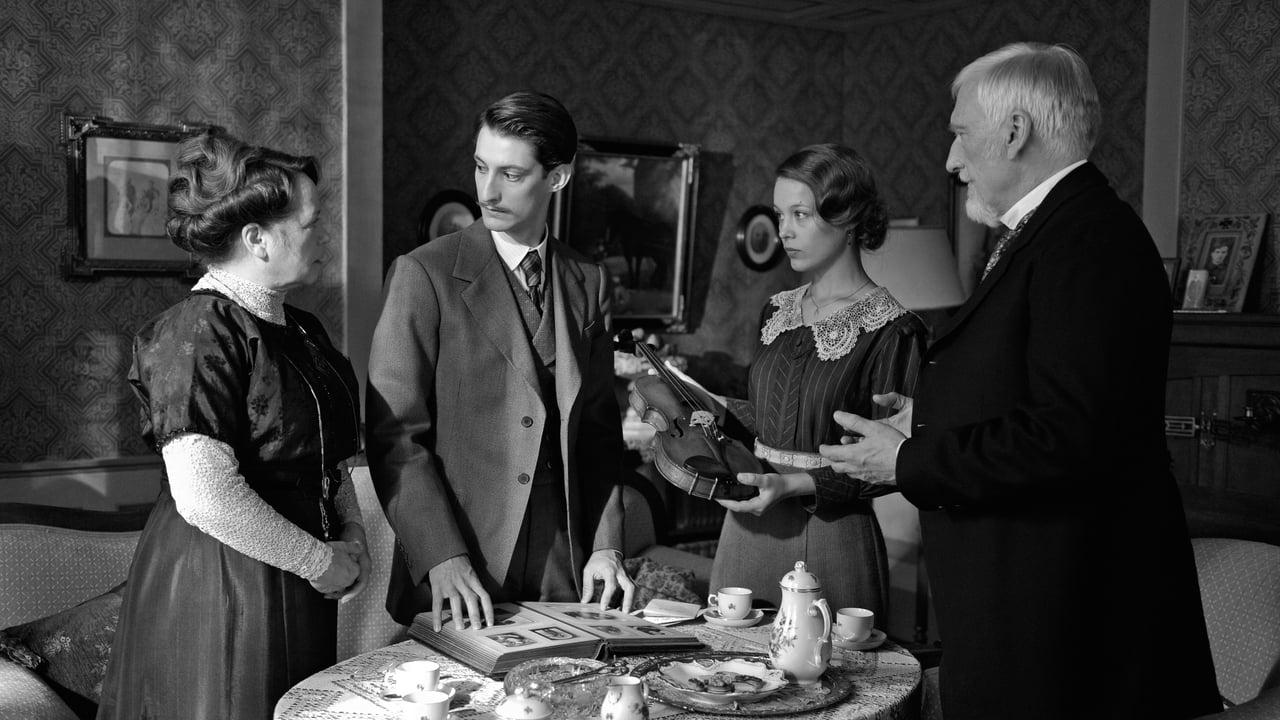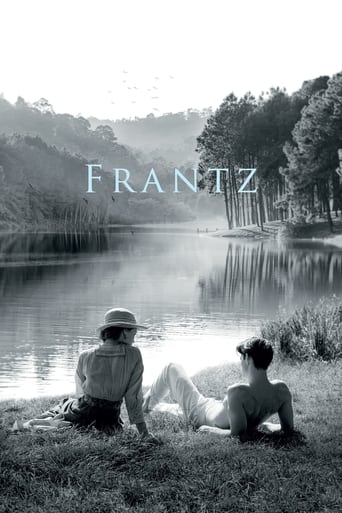



Absolutely Fantastic
Clever, believable, and super fun to watch. It totally has replay value.
View MoreIt’s fine. It's literally the definition of a fine movie. You’ve seen it before, you know every beat and outcome before the characters even do. Only question is how much escapism you’re looking for.
View MoreA terrific literary drama and character piece that shows how the process of creating art can be seen differently by those doing it and those looking at it from the outside.
View MoreIt's 1919 in the small town of Quedlinburg, Germany. Anna dutifully lays flowers at her financee Frantz Hoffmeister's grave. She's living with his parents who are still devastated from his death at the front. An unknown Frenchman named Adrien is visiting Frantz's grave. He tells them that he's a friend from their time in Paris.The black and white look is poignant and sad. There are interesting sections of colour. I do question if the Hoffmeisters would not question Adrien's story. It's obvious where the story is going. There are good moments throughout. The most powerful is Anna on the train as she first witnesses the war damage. The ending has a good helping of understated sadness but I was looking for something even darker. This film is poetic and works fine.
View MoreLook, I'm not that guy to write reviews of movies online, and I'm not that guy to watch a love story with subtitles. But quite by happenstance I watched this film, and I was blown away. I didn't think I was going to make it at first, to be honest, due too the pace. But Paula Beer (whom I've never seen before this movie) kept me watching. What a great actress for this role! By the movie's end I was wishing for more, begging the movie not to end. I sat and stared at the credits' scroll (words I couldn't understand in French) and listening to the music. It's that good that I stared in awe at the credit scroll! I'll now go back to watching Mission Impossible and Bourne movies (more my style), but I'll always remember Frantz, and a part of me will always wish that I could experience it again for the first time.
View MoreFrançois Ozon's latest movie Frantz packs in audience pleasers: superb black-and-white photography of spellbinding locations; nonstop suspense; brilliant character portrayals by Paula Beer as Anna and Pierre Niney as Adrien; the subject of war's pointlessness; the right or wrong of lies; and human psychology when it comes to love. This last and most compelling aspect of the movie, discussed below, is for a post-viewing conversation (i.e., this review may be a spoiler). The movie begins in Quedlinburg, Germany, after World War I, with the Hoffmeister family grieving for the loss of Frantz, Magda and Hans' son and Anna's fiancée. The three live together, Anna already like a daughter to Frantz's parents. Hans and the Germans in town bitterly hate the French for killing their sons. Frenchman Adrien Rivoire shows up to lay flowers on Frantz's grave and as a result meets Anna who brings him home to her surrogate parents. Over time, Frantz's parents come to love and cling to Adrien for his past friendship in Paris to their lost son. Adrien becomes a living embodiment of Frantz, keeping him alive for the parents. It helps that Adrien comes from the same cultured class as the Hoffmeisters—he formerly played violin in a prominent Paris orchestra. Adrien's last name Rivoire is too close to the French word revoir—to see again—not to have special meaning for Adrien's role in this story. Love comes in all shapes and sizes. Anna and Adrien's love presents the movie's most fascinating content. Adrien, caught in the difficult situation of meeting Frantz's parents (with the postwar Germans and French hating each other), weaves more and more lies about his friendship to their son. Adrien's a meek, malleable person, which becomes his character flaw in the end when he goes along with his mother's choice for a wife. He has no mettle, no courage, and chooses an easier path controlled by others. In Quedlinburg, spending time with the Hoffmeisters and learning about Frantz's past, Adrien becomes part of the family. When he finally confesses to Anna what really happened in the battle trenches, she's naturally devastated. But she doesn't reveal the truth to Frantz's parents—she spares them yet another grief, this one involving Adrian's travesty. Here the movie lets us ponder lies—Adrien's lies, Anna's decision to keep up his lies, and what the future will be for her maintaining and further developing them for the remainder of the Hoffmeisters' lives. Are some lies acceptable? To what extent? Can Anna ever live a fulfilling life if she perpetrates serious lies? So many people, so many families, live out their lives harboring such secrets and lies, and Anna's case is but one example. After Anna has learned the horrible truth from Adrien, she must begin all over in her nascent love for him, and succeeds. Once she has forgiven him—which entails understanding the stupidity of war, where one soldier in a trench has no choice but to kill his enemy or be killed—she allows her love to rekindle. But what shape and size is Anna's love? It's one of life's more mysterious forms, where the young woman loves the very person who killed her lover; it's a love that encompasses the killer's connection to the past love, a strange mix but real and food for thought. The same is true for Adrien: he loves the woman of the man he killed as if, again, Frantz's taken life can resurrect permanently through the new bond. It's a love triangle of a warped sort. The Hoffmeisters also want the Anna-Adrien union for the same reason—the men's supposed bond of yore joined to Anna now will keep Frantz forever within the living family. Weird, but not weird, precisely because love has so many faces. A few other points about the movie: The parallel structure of Adrien experiencing German hatred in Quedlinburg, and then Anna, in part two, experiencing anti-German behavior in France, works to emphasize the antiwar message. Plus we are told a few times that Frantz, like Adrien, was a pacifist. Indeed, his rifle in the trench where he died was not loaded. He would rather be killed than kill. The score by Philippe Rombi sets the mood for every scene and the film's nonstop suspense, but it never intrudes on the action. Its apt subtlety achieves perfection. Finally, at those rare moments where joy in nature or the good things in life occur, the movie switches to color, briefly, like the quick glows we all experience in life. Then the story returns to the black and white of the war's bleak aftermath, not unlike Italian neorealism except for the sumptuous quality of this movie's cinematography. Manet's painting Le Suicidé (The Suicide) comes up several times. It relates directly to Anna and Adrien's mental destitution about the truth of what happened to Frantz. However, it's not answered why this painting was one of Frantz's favorites, nor why Anna visits it at the end of the movie when she's embarking on her "freed" life in full blooming color. The man viewing the painting on the bench beside to her is just like Adrien—sensitive, effete, melancholy. Are the two sitting there before a depiction of suicide to show their contrast—Anna no longer tied to Frantz or the past and the man dealing with suicidal thoughts? Or, is it suggested that Anna's past will link these two strangers in an uncanny love? Will Anna connect to him because he's like Adrien, who in turn was the embodiment of Frantz? Love and human psychology are the tantalizing material of this film.
View MoreNations reconcile after war but it is only people who can grant forgiveness. For many, it is an impossible grant that leaves wounds unhealed. This theme dominates the Franco-German film Frantz (2017), a psychological drama about a former soldier's personal quest for forgiveness. Filmed mostly in black and white, it is a poetically beautiful essay about guilt, lies, and tragic loss, set in the between-wars era.The storyline is shaped by deep grief and national hatreds. In a small German village, Anna (Paula Beer) is grieving the death of her fiancé Frantz who was killed fighting in France. She visits his gravesite daily and one day finds that someone else has left flowers on the grave. A few days later she finds a stranger standing solemnly at the headstone and introduces herself to a brooding Frenchman called Adrien (Pierre Niney). They are soon in conversation and Anna is shocked to hear that Adrien had spent time with Frantz in Paris, sharing a love of music, art, and good times. Anna introduces Adrien to Frantz's parents who bitterly blame all French people for their son's death. As the parents hear Adrien share his grief and his memories of Frantz, a bond begins to form between all of them, at first reluctantly then warmly. But the mysterious Adrien is harbouring a tragic secret. Eventually he breaks down and confesses to Anna with whom a romantic attachment has developed. She immediately shuns him and he returns to Paris. Time elapses and she cannot forget him. Urged by the parents, she goes to Paris to find Adrien where she must confront a new loss and learn about forgiveness.For audiences expecting an action-driven narrative, there little on offer in this film. The story moves forward in sombre but exquisite monochrome and often tense dialogue that is punctuated by a few scenes in colour as respite from melancholy. The performances of its four main roles are laden with emotion but stops short of melodrama. The principals Paula Beer and Pierre Niney give finely nuanced performances evoking the behavioural norms of the era. All performances are high-wire acts of emotion and dramatic tension: the pain on the parent's faces when they hear stories of their son is palpable and the tense suppression of Adrien's dark secret is electric. Anna's struggle between her loyalty to the cherished memory of Frantz and the possibility of new love is mirrored in the Franco-German struggles with blame, guilt, grief, and hope. As the relationship between Anna and Adrien strengthens there are several lyrical scenes of languid days enjoyed at the side of a pond that are composed like painting masterpieces and emblematic of the artistry brought to the making of this film.Frantz is multi-layered with intense emotion that is explored at the personal and national levels. Truth is always the first victim of war and where truth fails, lies, promises and secrets take over. Frantz can rightly be described as an art-house feminist film. By taking Anna's viewpoint it encompasses universal themes of agency over victimhood that empower her to move on in her life.
View More